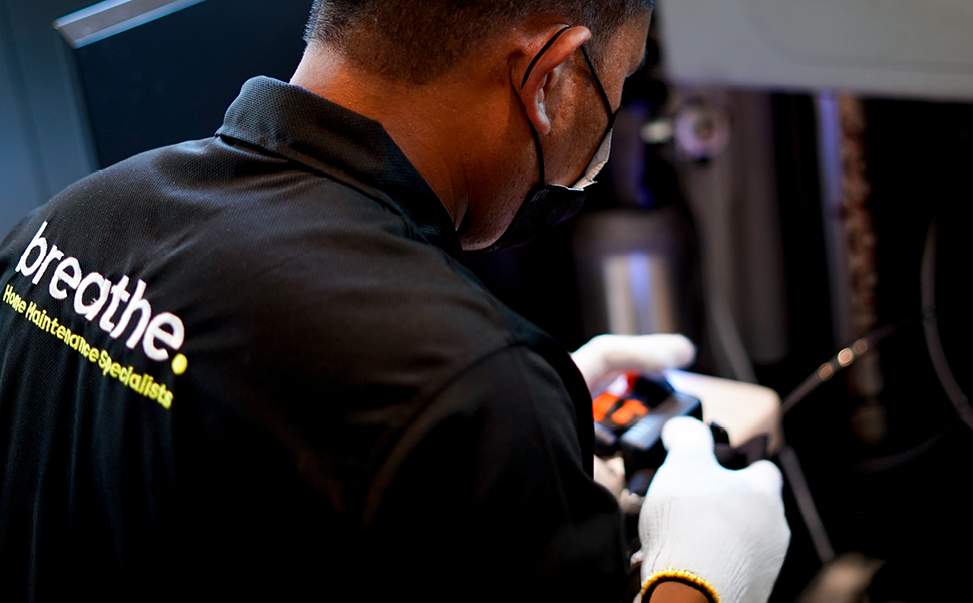Have you ever noticed your water pressure gradually reducing, or perhaps the water around your unit flowing sporadically? This could be a clear sign of hard water mineral deposits building up inside your plumbing system – even as far as the filter on the tap head itself. If hard water is left untreated, these mineral deposits can affect your appliances, create costly burst pipes in your hot water storage tanks, and clog both your hot and cold water supplies to taps and showers. Hard water is a common issue in many households, but the consequences often go unnoticed until appliances start underperforming or failing altogether.
Read on to better understand the impact of hard water on your household appliances and how to address it, protecting your home—ultimately saving on energy bills, and even improving your overall quality of life.
What is hard water?
Hard water is water that contains high levels of minerals—mainly calcium and magnesium—picked up as rainwater passes through soil and rock before entering your home’s plumbing system.
Many regions across the UK are affected by hard water due to local geology. Areas with chalk and limestone bedrock are particularly prone to higher water hardness levels.
Soft water, on the other hand, has minimal mineral content, making it gentler on appliances, skin, and hair. In contrast, hard water can lead to buildup, reduce efficiency, and cause long-term damage to your plumbing and appliances.
How do you identify hard water in your home?
Some tell-tale signs of hard water include:
- Limescale is a hard, chalky deposit made of calcium carbonate that forms when hard water evaporates, leaving behind mineral residues. It can accumulate in taps, kettles, and showerheads, reducing efficiency and water flow over time.
- Soap scum residue on sinks, tiles, and shower screens.
- Reduced water pressure or intermittent flow from taps and showers.
- White spots or streaks on dishes and glassware after washing.
To test for hard water, you can purchase a simple DIY water hardness testing kit or contact a professional for a detailed assessment.
How is hard water affecting your appliances?
Washing machines:
Hard water leads to limescale buildup inside your washing machine, reducing the efficiency of the heating element. This results in longer wash cycles, higher energy consumption, and a shorter lifespan for the appliance.
Dishwashers:
Limescale can clog spray arms and damage internal components, leaving streaks on glasses and dishes, lowering cleaning performance, and increasing maintenance costs.
Burst pipes:
Mineral deposits narrow your pipes, restricting water flow and increasing pressure. Over time, this added strain can cause leaks or even burst pipes—especially in hot water storage tanks where heat accelerates mineral accumulation.
Clogged shower and tap supplies:
Mineral buildup within your shower and tap supply lines reduces water pressure and leads to inconsistent flow. Over time, deposits can completely block tap filters and shower nozzles, requiring frequent cleaning or replacements.
How to fix hard water
Water softeners:
A water softener system, typically using ion-exchange technology, is one of the most effective solutions. It removes calcium and magnesium ions, replacing them with sodium or potassium. This process reduces water hardness, protecting your plumbing system and extending the lifespan of your appliances.
Salt-free conditioners:
For a low-maintenance and eco-friendlier option, salt-free conditioners neutralise minerals rather than removing them. This prevents limescale build-up without altering the water’s composition.
Point-of-use filters:
For targeted protection, point-of-use filters can be installed on showers and taps. These filters reduce mineral deposits, improving water quality and preventing build-up in faucet heads and shower nozzles. Replacing them every six months ensures optimal performance.
Do filters work for hard water?
The short answer: Yes—but with conditions.
Shower filters can help by reducing mineral content, which benefits both appliances and personal care (hello, healthier hair and skin!). However, their effectiveness depends on the severity of your water hardness.
For the best results, combine a whole-house water softener with point-of-use filters in high-usage areas. Regular maintenance, including timely filter replacements, is key to keeping hard water issues at bay.
Can hard water cause hair loss?
If you’ve noticed hair thinning or dryness, hard water could be a contributing factor. Mineral residues left on your scalp and hair strands can lead to irritation, dryness, and brittleness—potentially increasing hair shedding over time. While hard water isn’t a direct cause of hair loss, it can worsen underlying scalp conditions. Installing a hard water shower filter can help minimise these effects and improve hair health.
Protect your appliances
Hard water is more than just a plumbing issue—it impacts your appliances, your budget, and your daily comfort. By tackling the problem early, you can extend the life of your appliances, reduce energy costs, and enjoy cleaner, healthier water every day.
Contact our professionals today to explore your options for managing hard water and staying ahead of the curve.


